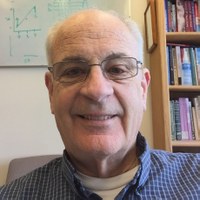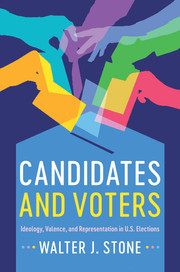Walter Stone: Electoral Optimist
Quick Summary
- Expert on U.S. elections says they may not not be perfect, but they work better than you might think.

It’s easy to become pessimistic about U.S. elections when it seems like corrupt politicians are being elected by a voter base that seems largely uninformed and disinterested. However, research professor Walter Stone, an expert on U.S. elections, disagrees with this cynical view and argues that elections are working better than most people think.
Stone studies U.S. elections from many different aspects—why candidates choose to run, the role of party activists in presidential nominations, the effect of third parties on the major two parties, and how people make the choice of whom to vote for.
“I feel like I’m contributing to society in my teaching and my research,” he said. “if I can pass on some good news about why things are working a little better than people thought, then that’s a contribution.”
Stone has been an active professor and researcher for more than 40 years, the author of four books, the principal investigator on a number of National Science Foundation-funded studies, and the former department chair of the UC Davis Political Science Department. He joined the rank of emeritus professors in June 2017, retiring from full-time teaching.

His most recent book, Candidates and Voters: Ideology, Valence, and Representation in U.S. Elections, published in July 2017, is the result of a long-term study of the 2010 House of Representatives campaigns. He surveyed random districts across the country and used “expert informants,” especially informed people from those districts, to get a pulse on each of the candidates’ policy stances and personalities and leadership characteristics, also known as valence. Stone and his team compared this with the results of the election to see whether voters chose the candidate that best represented their interests, whether a candidate’s valence or policy mattered more to voters, and how voters who identify with a particular party vote.
The message of the book is simple: that elections work better than people think. While he admits the system isn’t perfect and that a majority of Americans are ill-informed, he says overall, voters tend to do a good job at picking competent candidates that represent their interests, pushing back against the extreme pessimism about our democracy among leading scholars. “I’m not a raging optimist, but I think a deeply skeptical view is wrong,” he said.
News-making research
Stone’s work has caused controversy in Washington. In a letter to the editor of The New York Times in 2013, former House Majority Leader Eric Cantor used Stone’s NSF-funded study that became Candidates and Voters to argue that the social sciences shouldn’t be funded. Cantor argued it was a waste of money because everyone already knew the results of the 2010 elections and saw no point in studying them further.
The political scientist's previous project, the Candidate Emergence Study, which looked at why candidates decided to run for office, caused even more controversy. Several members of Congress misunderstood the study and thought Stone was using NSF money to recruit candidates to replace them. It led to media coverage, debate on the House floor, an investigation by the inspector general, and a small NSF budget cut. “I’ve gotten negative attention from the darndest places,” he said, laughing. “I have a file of all this stuff.”
Influential educator
As an undergraduate, Stone planned to go to law school and remembers laughing at the idea of becoming a professor. But he discovered that he didn’t enjoy legal work, so he changed career paths and earned a Ph.D. in political science from the University of Michigan. Stone got his start at Grinnell College in Iowa and spent the majority of his professional career at the University of Colorado-Boulder before joining UC Davis in 2001. He served as department chair for five years.
“The [political science] department’s really been on an upward trajectory for about 15 years,” said Stone’s colleague and friend James Adams, “and it started when Walt came here and became chair of the department. So much of that is Walt.”
"Best job in the world"
When you talk with Stone, it quickly becomes clear that he loves what he does. He maintains a loose, laid-back demeanor and frequently cracks jokes, all while giving in-depth explanations of political science.
As an emeritus professor, Stone said he will miss working with and teaching students at UC Davis.
“The students here are very bright, they ask interesting questions, and they are often interested in more than just what’s on the exam,” he said. “I think political science asks important and interesting questions and the classroom is a place that I’ve always found energizes me.”
Stone has especially enjoyed teaching introductory classes for freshmen or for beginning graduate students. “In both cases, you have the opportunity to open their eyes to something they otherwise wouldn’t know,” he said.
Though he has retired from full-time teaching, he plans to continue working with graduate students and conducting studies as a research professor. “I joke with my colleagues that I’m on permanent sabbatical because when you’re on sabbatical, you’re working,” he said. “You don’t retire from a hobby.”
Aside from his “hobby,” he is still trying to figure out retired life, though he hopes to learn the piano, travel, visit his grandchildren, and spend time with his wife of almost 50 years.
“I’ve always thought I was a pretty lucky guy,” he said. “Being a professor’s the best job in the world. A colleague, when he was retiring, said, ‘I realized I found a loophole in life,’ and that’s kind of how I feel.”
— Noah Pflueger-Peters (B.A., English, ’17)